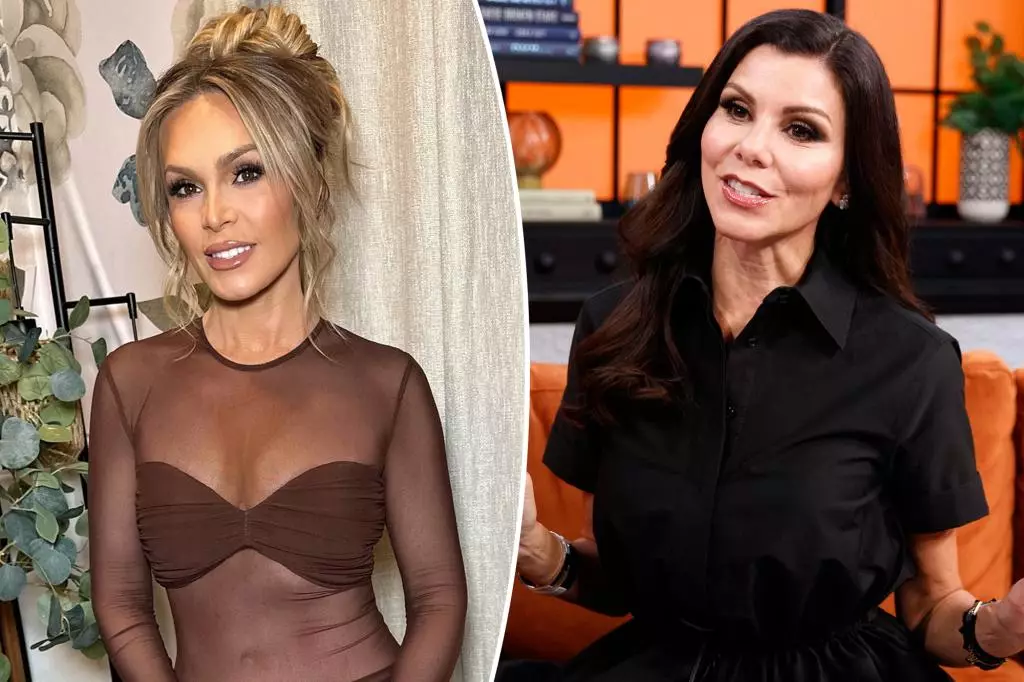In the high-stakes universe of reality television, rumors are both a weapon and a poison, capable of elevating or devastating careers overnight. The recent controversy surrounding Heather Dubrow’s comments about Tamra Judge and Gretchen Rossi exemplifies how fragile trust can be in this environment. While the allegations are rooted in claims from over a decade ago, their resurfacing illustrates the enduring power of gossip to influence public narrative and cast shadows on personal reputations. It’s compelling to consider that the story’s origins, whether factual or exaggerated, serve as a stark reminder that in the realm of fame, perception often holds more sway than reality.
The issue arises when whispers turn into full-blown accusations—sometimes based on hearsay, sometimes misinterpreted, occasionally malicious. For the cast members involved, these rumors threaten not just professional relationships but also their personal integrity. When Tamra Judge allegedly admitted to a weaponized form of manipulation, such as roofying a castmate, the implications extend beyond the scope of entertainment; they delve into ethical and moral territory. Yet, it’s critical to recognize that such claims, especially when dating back years, can be difficult to substantiate and are often cloaked in the cloud of hindsight, bias, and selective memory.
The Toll of Gossip on Personal Relationships and Mental Health
Beyond the superficial disputes aired for drama, rumors and accusations impose a deep strain on mental wellness. Cast members like Rossi and Judge have to navigate not only the storm of their public image but also their inner emotional landscapes. As Rossi refuted the claims about being roofied, emphasizing that her “naked wasted” episode was due to external influences rather than malicious intent, she demonstrated resilience. Still, the damage extended beyond any intended message—fueling ongoing feuds and shaping perceptions among viewers and insiders alike.
The raw emotional reactions, such as Tamra Judge’s abrupt exit from filming, reveal how fragile this web of relationships truly is. It’s one thing to disagree over petty disagreements, but when accusations threaten personal dignity and integrity, the resulting chaos can take a toll on all parties involved. For viewers, this ongoing saga underscores a larger issue: that behind the glamorous facade of reality TV lies a tumult of unresolved conflicts, insecurities, and longstanding grudges. The entertainment industry’s relentless focus on conflict, while profitable, often magnifies these personal struggles into spectacle—sometimes at the cost of genuine understanding or reconciliation.
Authenticity versus Performance: The Ethical Dilemma
Perhaps the most insidious aspect of these controversies is the blurred line between authentic relationships and manufactured drama. Reality TV is designed to entertain, yet viewers sometimes forget that many scenes are carefully curated—or manipulated—by producers seeking sensational content. The allegations against Tamra Judge, whether factual or not, highlight how easily the line between reality and performance can be crossed, fostering suspicion and distrust among castmates and fans alike.
For the individuals involved, the challenge lies in maintaining integrity amid a distorted environment that often rewards sensationalism. Heather Dubrow’s critique of Ginella’s storyline reflects a longing for authenticity, lamenting that misrepresentations and “nonsense” detract from genuine connections. It’s an insightful reminder that the true value of reality TV should rest on real personalities and meaningful relationships, not sensational tales that can tarnish reputations permanently. This ethical dilemma raises profound questions about accountability—both for the cast members and the producers who shape the narrative—and whether true transparency is possible within such a spectacle-driven landscape.
The Toxic Legacy of Social Media and Public Scrutiny
Adding fuel to the fire is the omnipresent reach of social media, which accelerates the spread of rumors and amplifies disputes. When allegations about past misdeeds surface on platforms accessible to millions, they become part of the public record, part of the ongoing controversy that can haunt individuals long after filming ends. The pressure to maintain a sparkling image becomes overwhelming, leading many to either retreat or become embroiled in defensive battles.
The fallout from these conflicts inevitably influences the career trajectories of those involved. Tamra Judge’s decision to temporarily leave the show exemplifies how casting disputes and allegations can influence a star’s willingness to engage in future projects. For viewers, it’s a stark lesson that the glamorous veneer of “reality” often conceals the ugly realities of jealousy, rivalry, and the destructive nature of rumor-mongering.
The current trend in reality TV underscores a need for industry introspection—should transparency and authentic storytelling take precedence over manufactured drama? Or are these conflicts inevitable given the nature of entertainment that thrives on conflict and controversy? Ultimately, it’s evident that gossip, if left unchecked, fuses with real-life personalities, creating a toxic environment that can damage reputations beyond repair and threaten the authenticity of the entire genre.

